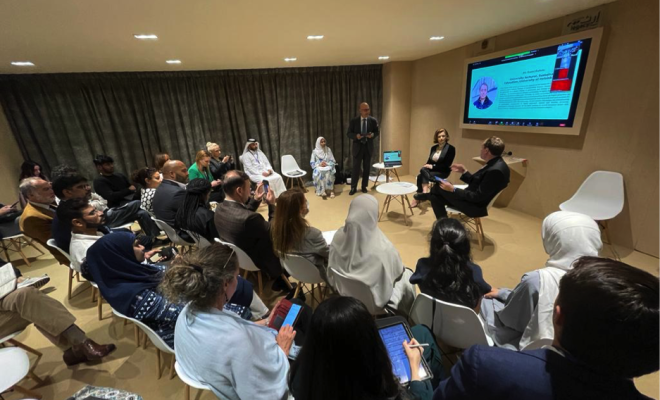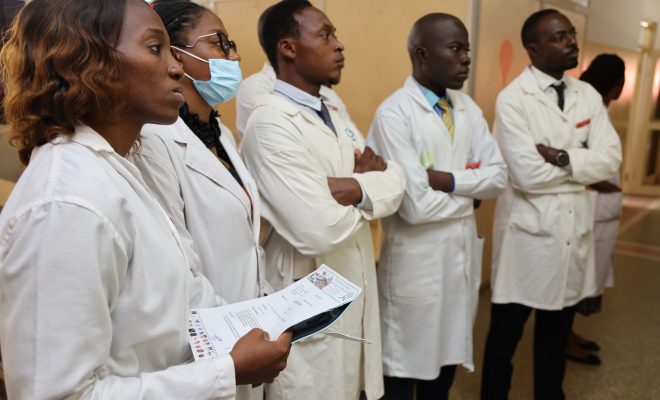A green future for all

On 6 December 2023 at the Greening Education Hub of the COP28, the joint session on “Greening Higher Education” brought together stakeholders from various sectors and UNESCO regions as a first step to promote multi-stakeholder partnerships in achieving greening higher education for a more sustainable future.
The three panel discussions focused on current practices and competencies for greening higher education. Also, they counted on the participation of youth representatives, who shared their concerns and demands for concrete actions in co-designing greener initiatives for the future.
The event was co-organized by UNESCO IESALC, the United Nations Office for South-South Cooperation (UNOSSC), and the University of Helsinki, in collaboration with Education Above All, IBM, the International Network for Quality Assurance Agencies in Higher Education (INQAAHE), Una Generacion, Global Student Forum, the UNESCO SDG4 Youth & Student Network, and Greening Education Partnership.
The first panel titled “Eco-system to Support Greening Higher Education” was joined by Dima Al-Khatib, Director of UNOSSC; George Tavola, Engagement Manager in Education Above All (EAA), and Justina Nixon-Saintil, covering the perspectives of UN agencies, civil society, and the private sector. It highlighted the importance of strengthening South-South cooperation, the role of civil society as well as the private sector in advancing green higher education, bridging the gap between communities and universities, and preparing the workforce for the current and future needs of the labour market.
The second panel, titled “Focus on Higher Education Institutions and Youth,” counted on the participation of Rami Ratvio, University lecturer of Sustainability Education, University of Helsinki; Azkha Mikhdar, Youth Leader in UNESCO SDG4 Youth & Student Network, and Susanna Karakhanyan, Immediate Past President in INQAAHE
The panel included the voices of academia, young people, and policymakers. It highlighted the importance of taking ownership and partnering, the important role education plays in skilling and upskilling when it comes to greening higher education, as well as the major role universities, teachers, and students play in taking ownership and creating movements
The third panel focused on ways forward and initiatives for greening higher education. It started with a pre-recorded video by youth and students from around the world advocating for the importance of acknowledging the intersection between greening higher education, science, technology, and innovation, as well as the importance of triangular corporations, specifically within the Global South, to build effective partners and work together for a better-greening education and a greener planet.
Dima Al-Khatib, Director, UNOSSC, in responding to the demands proposed by youth in the video, shared news about the launch of the UNESCO IESALC and UNOSSC joint pilot project on “Greening Higher Education Promoting the Role of Science, Technology, and Innovation in SDG Impacts through Meaningful Youth Engagement and Leadership among the South-South University Cooperation Network”, which aims to support the transfer of young people’s innovative solutions in greening initiatives through multi stakeholder partnership in the Global South.
Additionally, the panel included a prerecorded video from Sandra Goulart, Rector in Federal University of Minas Gerais (Brazil), who emphasized the need for universities throughout the globe to join in a global effort towards a more sustainable world” through teaching, research, and outreach.
Moreover, Riina Koivuranta, Senior Specialist, Community Relations of University of Helsinki, launched a greening higher education workshop for sustainability transformation in higher education institutions organized by the University of Helsinki and UNESCO IESALC and to take place in 2024.
Finally, Justina Nixon-Saintil, Chief Impact Officer, VP of Corporate Social Responsibility, IBM, (USA), stressed that IBM is building more AI content, more sustainability content, and more cyber security content. She also emphasized that IBM wants to make sure that it’s not leaving communities behind.
This event paved the way for a future where universities, UN agencies, NGOs, and private companies can seamlessly collaborate to build a greener planet through education. By fostering cross-sector partnerships, this meeting ignited a powerful movement towards greening education and creating a more sustainable future for current and future generations.
For full details of the discussion, please refer to the video of the event below:
RELATED ITEMS














